Impact Stories from Youth Engagement Policy Area
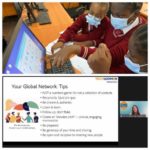
TechWomen begins virtual delegation to Cameroon
Fellow(s): Cameroon fellows and mentor delegates
Country: Cameroon, United States
Policy Area(s): Education Diplomacy/Mentoring, Empowering Women and Girls, Entrepreneurship, Professional Growth, Youth Engagement
The TechWomen delegation to Cameroon has officially begun, bringing engaging events to young students, recent university graduates, women leaders, entrepreneurs and more. Although this year’s delegations are virtual, the mission remains the same as ever: to strengthen an international network of women in STEM fields, creating partnership and exchange between the United States and TechWomen program countries.
In a kick-off U.S Embassy Briefing, fellows and mentor delegates had the opportunity to hear from representatives of the U.S. Embassy in Yaounde about Cameroon, its tech landscape and their priorities within the region. Week two began with Branding and Networking in a Virtual Era, a session that brought together mentors, fellows and university students in STEM fields to talk about creating meaningful and lasting networks in a virtual world. Mentors presented on cultural intelligence, building an online brand and managing virtual teams and more. “Be your authentic self. Don’t try to be someone else when you are online — be who you are,” mentor Janice Campbell said in her talk. In the third event, Design Thinking and Physical Computing, mentors and fellows met with over 100 girls from both Douala and Yaounde to explore the power of tangible computing and constructionism through making. At the end of the day, the students shared out what they learned: “When I came here I learned how to create a game, I learned about design thinking, and I also learned about people and the things they invented,” said one student.
Report Date...: 6/14/21
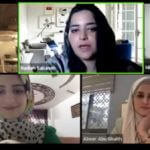
In panel fellows share advice and inspiration for women
Fellow(s): Israa Mousa, Nadiah Sabaneh
Country: Palestinian Territories
Cohort: 2015, 2020-2021
Policy Area(s): Education Diplomacy/Mentoring, Empowering Women and Girls, Entrepreneurship, Professional Growth, Youth Engagement
2020-2021 fellow Israa Mousa and 2015 fellow Nadiah
Sabaneh were featured in an online panel for an event
that spotlighted inspiring women in the Palestinian
Territories who spoke about their challenges, resilience
and advice for women in technology. The event was
hosted and live-streamed on YouTube by Women in
Tech Dubai.
On the panel, Israa shared her achievements in tech
despite the barriers she has faced, speaking about how
she has supported young entrepreneurs in Gaza, empowered girls with digital inclusion skills and recently
launched a new startup that helps women bring their handicraft businesses online. “As humans we
underestimate ourselves and our efforts,” Israa said when asked about impostor syndrome. “Don’t be hard on
yourself, find the balance between work and family and your needs.” Nadiah, a tech hub manager, program
manager and mentor, spoke about her career path and her dedication to empowering women in her
community: “The reason is to pave the way for other women, so they don’t need to go through the same
challenges we went through,” she said.
Report Date...: 6/14/21

Fellows graduate first cohort of girls from Techkyzdar
Fellow(s): Nazira Sheraly, Aiturgan Zulpukarova, Elena Chigibaeva, Gulzire Minbaeva Screen reader support enabled. Nazira Sheraly, Aiturgan Zulpukarova, Elena Chigibaeva, Gulzire Minbaeva
Country: Kyrgyzstan
Cohort: 2016, 2017, 2018
Policy Area(s): Education Diplomacy/Mentoring, Empowering Women and Girls, Entrepreneurship, Professional Growth, Youth Engagement
For four months, the TechWomen fellows behind the AEIF-winning
project Techaim – Nazira Sheraly (2016), Aiturgan Zulpukarova (2017)
Elena Chigibaeva (2018) and Gulzire Minbaeva (2018) – have been
working with their first cohort of girls through their newest program,
Techkyzdar. Their program pilot has officially concluded after
empowering the girls with tech skills, teaching them how to create
mobile apps and sharing about professions in STEM fields.
To commemorate their graduation from Techkyzdar, the girls in the
program created a website where they highlighted the importance of
working in a team, how they grew as individuals and how they created
mobile apps for the Technovation challenge. They also shared their
own profiles and skills as mobile app designers, video editors and graphic designers. “This project has changed a
lot in my life,” wrote one participant. “For example: I overcame the fear of communicating with people, became
more confident in myself, all thanks to this project.”
Report Date...: 6/14/21

Fellow selected as member of Pakistan’s National Youth Council
Fellow(s): Nida Shehzad Farooqui
Country: Pakistan
Cohort: 2020-2021
Policy Area(s): Empowering Women and Girls, Professional Growth, Youth Engagement
This week, it was announced that 2020-2021 fellow Nida Shehzad Farooqui is one of 32 young leaders selected as a member of Pakistan’s National Youth Council. The council is part of Kamyab Jawan, a program of Pakistan’s Prime Minister that focuses on empowering Pakistan’s youth and investing in their social and economic development. Nida is the lead of digital and innovation for Sehat Kahani, an all-women network of 1,500 virtual physicians that aims to democratize healthcare. Her focus on the council will be health and well-being, advising Pakistan’s policy-making in healthcare and capacity-building of young people and women.
In Pakistan, 64% of the population is below the age of 30, but Nida says that youth have not always been included: “Unfortunately, for the longest time, we were not involved in national level decisions and policy making. Today, I’m extremely grateful to the Prime Minister and his initiative,” she said. Nida will serve on the council for two years, and hopes to create greater conversation around healthcare, education and leveraging technology for change. “We need to leverage technology and come up with innovative solutions to make it easily accessible and free of financial implications,” she said. “Our youth is the future of Pakistan, and we need to continuously add value to their knowledge and skills, and prepare them for the fast-changing world ahead.”
Read More »Report Date...: 6/7/21
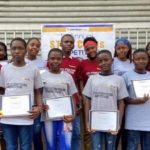
AfriTech Hub hosts its inaugural STEM Club Competition
Fellow(s): Sabina Nforba
Country: Cameroon
Cohort: 2020-2021
Policy Area(s): Economic Impact, Education Diplomacy/Mentoring, Empowering Women and Girls, Entrepreneurship, Professional Growth, Youth Engagement
2020-2021 fellow Sabina Nforba organized the first STEM Club Competition hosted by her STEM education initiative, bringing together students to engage in technology and learn about STEM. Sabina is the co-founder and president of AfriTech Hub, an organization that empowers young students to pursue STEM education and STEM careers. AfriTech Hub has worked with over 3,000 students through its clubs, workshops and summits.
AfriTech Hub launched STEM clubs at the beginning of the academic year in schools throughout five cities in Cameroon. Despite setbacks, including the COVID-19 pandemic and a lack of resources, Sabina, in partnership with STEMpreneur, trained AfriTech Hub team members to serve as facilitators for the STEM clubs. “Like every leader faced with challenges, I knew that they were inevitable, and what makes people different is their attitude when faced with these challenges,” wrote Sabina. Last week’s STEM Club Competition convened student representatives from AfriTech Hub’s partner schools to congratulate them for their hard work and facilitate activities in video game development, animation, electronics and more. “The students, ever so enthusiastic, developed video games and build a traffic lights system and a lie detector machine using Arduino electronics,” wrote Sabina. “We are extremely proud of what these students have accomplished in the course of the year and during this event. The energy here was contagious.”
Report Date...: 5/31/21

Fellow speaks about creativity and innovation in education
Fellow(s): Nabila Bashir
Country: Jordan
Cohort: 2018
Policy Area(s): Education Diplomacy/Mentoring, Professional Growth, Youth Engagement
Last week, 2018 fellow Nabila Bashir presented at the 4th
Educational Forum, a virtual event organized by Abu Dhabi
University in partnership with UNESCO and Queen Rania Teacher
Academy. With a theme of Future of Education, Innovation and
Creativity, the event brought together international education
experts to discuss what’s next in education.
Nabila is a senior business development manager at Queen Rania
Teacher Academy. In her presentation, she spoke about the
future of teaching, sharing why creativity and innovation is so
important for educators and their students. “The world needs
creativity, because problems aren’t getting simpler,” said Nabila. “Instead of looking at what is or what has
been, we need to start looking at what we can be.” Nabila emphasized the need to democratize access to
innovation tools, making them accessible to educators everywhere and empowering them to set up a climate
conducive to creativity. She also encouraged teachers to establish communities of practice that support risktaking
and the sharing of best practices to optimize creativity.
Report Date...: 5/31/21

Fellow shares how she led Technovation through COVID-19
Fellow(s): Mutriba Akhmedova
Country: Tajikistan
Cohort: 2015
Policy Area(s): Education Diplomacy/Mentoring, Empowering Women and Girls, Entrepreneurship, Professional Growth, Youth Engagement
2015 fellow Mutriba Akhmedova was interviewed this month by
Technovation founder and CEO Tara Chklovski, speaking about
Technovation’s success in Tajikistan and how she worked to
engage girls through the COVID-19 pandemic. In addition to
working as a project coordinator of TechWomen fellow-led
T.I.M.E for Women, Mutriba launched Technovation in Tajikistan
and serves as its chapter ambassador.
In the interview Mutriba shared that, in year two of Technovation
Tajikistan, enrollment went from 50 to 300 girls. Year three, held
during the pandemic, Mutriba and her team registered 600 girls while expanding to new regions of the country.
She also spoke about the challenges the girls faced during the pandemic as Technovation programming
transitioned to a virtual format and offered new ways of learning. Mutriba engaged girls online via Telegram,
assigning them weekly tasks and creating friendly competition. She also provided professional development
opportunities for the mentors, encouraging them to expand their skills. When asked what inspires her, Mutriba
said, “What inspires me is when I hear that I’ve helped inspire someone else.”
Report Date...: 5/31/21
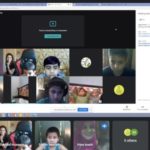
Fellow holds science camps for kids around the globe
Fellow(s): Saba Rasheed Malik
Country: Pakistan
Cohort: 2017
Policy Area(s): Education Diplomacy/Mentoring, Empowering Women and Girls, Entrepreneurship, Professional Growth, Youth Engagement
2017 fellow Saba Rasheed Malik launched a summer STEAM camp for kids, bringing students through DIY lessons that teach the fundamentals of STEM. The program is a part of weePro, the STEM education program Saba co-founded that teaches young students about computational thinking, robotics, programming and more.
The camp began this week with Demo Week, three days of free programming that includes learning about science through common household items as well as coding from scratch. Students joined Demo Week’s first event from around the world, including the United States, Saudi Arabia, the UK and Pakistan. The second event brought students from multiple regions of Pakistan as well as London for a coding session where they learned how to build a computer game. Saba offers discounts to girls as a way to encourage them to participate in STEM. “It is a step forward to respond to gender parity in science and technology,” she said.
Report Date...: 5/24/21
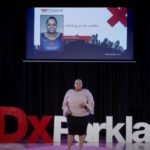
Fellow speaks about the power of mentorship at TEDxParklands
Fellow(s): Dr. Chao Mbogho
Country: Kenya
Cohort: 2017
Policy Area(s): Education Diplomacy/Mentoring, Empowering Women and Girls, Professional Growth, Youth Engagement
This month, 2017 fellow Dr. Chao Mbogho spoke at TedXParklands in Nairobi, sharing four qualities of impactful mentorship programs and reflecting on her career in computer science. Chao is the founder of KamiLimu, a free mentorship program for computer science students at Kenyan universities that enhances their learning experiences; the program ensures that each cohort has 50% female-identifying students.
“Mentorship is not about creating someone in your own image, but allowing them to create themselves,” Chao said in her talk, Holding up the Ladder. Chao outlined her learnings from running KamiLimu, emphasizing that successful mentorship programs must create safe spaces, center on students’ mentorship needs and focus on depth and structure. “We’ve seen students who have become leaders in their local and international communities,” said Chao. “I call upon each one of us to hold the ladder up for others. If we can do these we can impact one, 10, 100 or even 1,000 others.”
Report Date...: 5/24/21
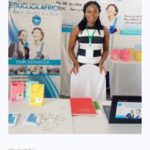
With EduClick Careers fellow connects young people to jobs
Fellow(s): Angele Messa
Country: Cameroon
Cohort: 2019
Policy Area(s): Economic Impact, Education Diplomacy/Mentoring, Empowering Women and Girls, Entrepreneurship, Professional Growth, Youth Engagement
2019 fellow Angele Messa has launched EduClick Careers, a job
portal with a mission to help one million young people access
jobs and other opportunities by 2025. Angele is the founder of
EduClick, an EdTech platform that offers alternative learning
methods for those who don’t have access to formal education
in Cameroon. With both offline and online educational
methods, EduClick supports displaced people, recent graduates
and young professionals who are looking to gain marketable
skills.
In addition to listing the latest job opportunities and
scholarships for young people, EduClick Careers offers
resume/CV assistance, support creating a business plan and
tools to create an online presence. By offering a comprehensive search engine for young people, Angele hopes
to democratize job access, matching talent to opportunity regardless of geographic location and gender.
Report Date...: 5/17/21

